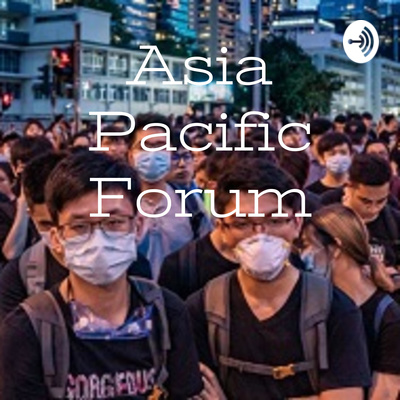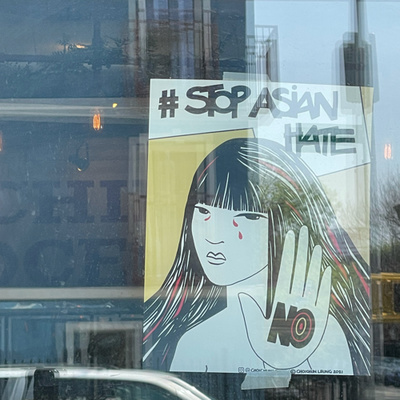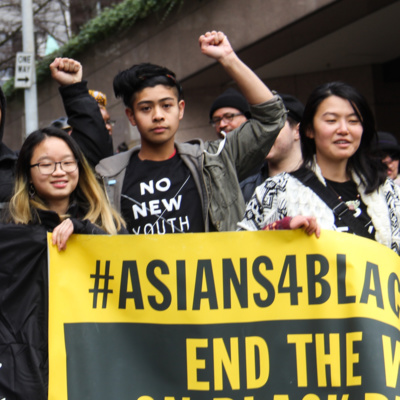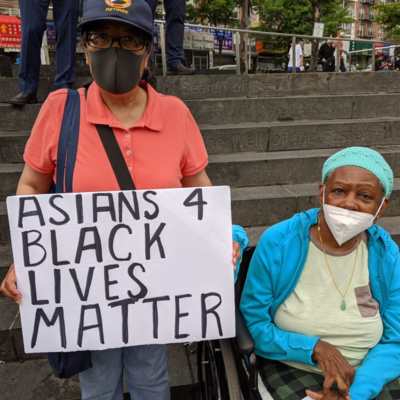
Asia Pacific Forum
By Asia Pacific Forum
Sign up for our email list to get updates on new episodes

Asia Pacific ForumJun 28, 2023

Remembering Hyun Lee: A Warrior for Justice in NYC’s AAPI and LGBTQ Communities and the Korea Peace Movement
This Pride Month episode is a special tribute to a former APF collective member and dear friend Hyun Lee, who passed away last year in 2022. Hyun was an APF member for several years from 2010, mainly covering stories on the people’s struggles in South and North Korea and against US imperialism and militarism especially in East Asia.
Hyun (also known as Lee Hyun Jung) was a long-time, beloved member of many organizations and communities locally in NYC, Philly and also nationally and internationally. She was widely known and admired as a brilliant, visionary, and powerful organizer in the movement for peace, justice and liberation on the Korean peninsula. In remembrance of Hyun’s inspiring and tireless work as a movement leader, a highly trusted friend, comrade, and mentor, we’ll be sharing three of her past APF shows. In addition to shows focused on North Korea and also on anti-Asian violence, two areas where she dedicated most of her organizing work, we will be highlighting her contribution and legacy as a queer woman to the LGBTQ Korean disaporic community.
-- Mijounga Chang
You can learn more about Hyun's life and work in this essay by Christine Hong of the Korea Policy Institute.
Image credit: Korea Policy Institute

Corky Lee's Legacy
For decades, Corky Lee depicted the struggles, joys, conflicts and connections that make up the warp and weft of everyday life in Chinatown, and gave us a ground-level view of Chinatown’s social, labor and political activism. Unlike conventional photojournalists who covered Chinatown at the time, the self-taught photojournalist was actually rooted in this community, He cut his teeth as a young activist with the radical organizations that defined the East Coast wing of the Asian American movement. And over the years, he documented the evolution of movements for racial justice, economic equity and civil rights in Chinatown and Asian America.
Last year, a tribute exhibit was held at Pearl River, my family’s store and a place that Corky had frequented since the 1970s. On display was not a retrospective of Corky’s work, but an array of photographs taken by colleagues and friends, who had, in one way or another, been influenced by Corky’s style and approach to the medium. I interviewed several artists about their work and Corky's legacy.
Chee Wang Ng is a Malaysian-born artist and designer and one of the curators of the exhibit.
Wai Ng is a New York based photographer.
Stan Honda is a photojournalist who has documented the history of Japanese American concentration camps during World War II.
Louis Chan is a New York-based photographer, born and raised on the Lower East Side.
Cindy Trinh is a New York-based photojournalist and social activist.
Finally, we bring you an interview with Corky himself from the APF Archives: I spoke with him at the "Serve the People" exhibit, about the early days of the Asian American movement in New York, at the Interference Archive in Brooklyn in 2013.
Learn more about Corky Lee and the new documentary about his career at corkylee.org.
The opening and closing music is "We are the Children," from A Grain of Sand: Music for the Struggle of Asians in America (1973 Paredon Records)
--Michelle Chen, co-producer, APF Collective
If you’d like to learn more APF Forum and listen to our archived episodes, go to https://anchor.fm/asiapacificforum. You can also view our older archives through New York University's Asian/Pacific/American Institute at https://apa.nyu.edu/. If you would like to contribute to or help produce Asia Pacific Forum, you can find out more about joining the APF Collective at asiapacificforum@gmail.com.

Confronting Caste in the South Asian Diaspora (with Paula Chakravartty and Ajantha Subramanian)
Over the past few years, the Asian American community has been navigating the country’s tumultuous racial and ethnic politics in unprecedented ways--as the targets of racial violence, as an increasingly important force in electoral politics, as the subject of countless pop cultural tropes, and as an ambivalently positioned minority group in the American social hierarchy. But the issue of caste discrimination is often overlooked as a source of tension and conflict within South Asian diaspora communities. Within communities, caste issues are often downplayed, and accusations of caste discrimination in South Asian communities are often met with backlash and allegations of anti Hindu discrimination. But in recent months we have seen several high profile cases of caste discrimination and oppression, from alleged labor trafficking of low-caste workers to do manual labor for Hindu temples in several states, to Google employees calling out discriminatory treatment by dominant caste workers against their caste-oppressed coworkers.
To explore the ramifications of caste in the South Asian diaspora, Asia Pacific Forum’s Michelle Chen speaks with Paula Chakravartty, associate professor at the Gallatin School and the Department of Media, Culture and Communication, and Ajantha Subramanian Professor of Anthropology and South Asian Studies at Harvard University.
(Image: Equality Labs)

Cotton Ban in Xinjiang, Pandemic historical specificity of anti-Asian violence, and Remembering Corky Lee
In this episode, we look at the significance of the cotton ban from Xiang, untangle the data around the increase of anti-Asian violence across the country and in New York City, unpack how race, gender, and class issues impact Asian American communities, and we will end with audio archives of Corky Lee's voice; the unofficial Asian American photographer laureate died of COVID-19 in January of this year.
Cotton Ban in Xinjiang
In a segment broadcast initially on Dissent Magazine's Belabored podcast, we hear from Scott Nova, Executive Director of Worker Rights Consortium discusses why the cotton ban from China's Xinjiang region is significant and what it could mean for the movement for supply chain accountability.
Historical specificity of sex-based and gender-based violence on Asian women
On March 16, 2021, 8 people were killed in Atlanta by a gunman targeting massage parlors, an industry dominated by women of Asian ancestry. Six of those killed in Atlanta were women of Chinese and Korean descent. We'll share excerpts from the AF3IRM National Speak-Out Against Femicide. Mila Konomos, an Atlanta-based Korean adoptee, poet, artist, and activist, performs her poetry, "Do you see now?" Nayoung Kim Park, a Korean attorney and feminist, discusses how femicide is racialized and the need to attack this issue from a global perspective. AF3IRM National Chair Connie Huynh discusses militarized patriarchy and the need to organize.
Analyzing the rise of anti-Asian violence
Anti-Asian violence has gained visibility due to Stop AAPI Hate and organizations across the country mobilizing to highlight how attacks and harassment on Asian communities have been racialized with references like "China flu" and "China Virus." New York City is second to San Francisco with the highest reported incidents of anti-Asian violence. The subway slashing of Noel Quintana, an elderly Filipino, and the brutal assault of Vilma Kari, an elderly Filipina woman are a few examples.
We'll first hear street interviews with Alodie and Esther from the Rally Against Hate in Columbus Park, New York, on March 21. Dr. Russell Jeung, Professor at the Asian American Studies Department at San Francisco State University and one of the founders of Stop AAPI Hate, discusses the character shift of anti-Asian violence one year after the pandemic, movement solidarity work, and the higher reported incidents of violence on elders, women, and immigrants. Chris Kwok, attorney and one of the Asian American Bar Association of New York report authors: A Rising Tide of Hate and Violence discusses the importance of history, what anti-Asian violence has looked like in New York City, and the role of media influencers, law, and government have in accountability.
Remembering Corky Lee
Finally, we hear the voice of Corky Lee. He offers the same meticulousness in his interviews as he also recounts the stories behind each photo. In honor of his memory and legacy, we'll share publicly accessible audio excerpts from The New York Public Library, an interview with Corky Lee by Wun Kuen Ng, and our own Asia Pacific Forum Radio interview.

December 2020-Post-election Episode: the campaigns, the voters, and the future of immigration detention under Biden
In this post-election special (thank god it's over), we look at how the election has affected Asian American communities, and also how immigration issues in particular have played out for the incoming Biden administration.
We check in with Alvina Wong, Campaign & Organizing Director of the Asian Pacific Environmental Network, and Shaw San Liu, executive director of the Chinese Progressive Association, about how the election played out for AAPI voters in California, including the fight around Proposition 15, a ballot measure that would have raised taxes on high-priced commercial properties.
We also talk to Jerry Vattamala, Democracy Program Director with the Asian American Legal Defense and Education Fund, about the group’s extensive exit polling data on Asian Americans in New York, Florida, Georgia and ten other states plus Washington, DC. Not surprisingly, Biden won a significant majority of the overall Asian American vote, but there were pockets of Trump support, as well as some ethnic variations in voters’ choices.
Finally, we examine one of the critical issues Biden will have to deal with once he enters office: addressing the longstanding inequities in the detention system and undoing the disastrous policies that Trump has put in place over the last four years at the southern border. Yet many of the human rights violations that are occurring now with immigrant detention and deportation were prevalent under the Obama administration as well--that is, they happened when Biden was vice president. We talk to Silky Shah, executive director of the Detention Watch Network, about how much activists can expect from a Biden administration when it comes to addressing the mass incarceration and deportation of immigrants.
Image: Yin Zhao

Asia Pacific Forum August 2020
Asian America on the Black-led Uprising for Racial Justice
The Black Lives Matters protests that have spread around the country for the last several months have been punctuated by solidarity protests led by Asian American groups. We spoke to Thenmozhi Soundararajan of Equality Labs about the connections between anti-caste discrimination and anti-Black racism and the role of the South Asian American community in fighting both.
The Future of Dissent in Hong Kong
When Beijing passed a new security law for Hong Kong at the end of June, many activists on the island were both outraged and terrified, fearing that the law marked a death knell for the Hong Kong pro-democracy movement. It imposes major restrictions on dissent, massively expands Beijing’s political influence and control over the city’s legislature and judiciary, and enables some national security cases to be tried on the mainland. All these elements severely undermine the one country, two systems regime that was put in place during Hong Kong’s transition to mainland rule following the handover from its former colonial master, Britain. While many activists are panicking, it’s worth taking a step back and asking what exactly this means for the long-term future of political dissent in Hong Kong and the wider diaspora. We speak with Gina Anne Tam, a professor of Chinese history at Trinity University and observer of Hong Kong politics, about why the new Hong Kong security law matters, but maybe not the way a lot of people think it does.
Addendum: Tam noted after our interview that she drew from some of the work of Wilfred Chan, who has also been a guest on APF. For further reference, see:
Cultural protest in Chile and Palestine (Part 2)
Natisu, a Chilean-based musician and cultural worker with Trabajadoras de la Música, and Tarin Gonzalez, a Bronx-based activist with Existence is Resistance, reflect on militarized violence and the role of art in social movements.
---
Cover Photo: Scott Lum, CC BY-NC 2.0, cropped from original.

Asia Pacific Forum June 2020: COVID-19, Electoral Politics and Labor; Asian Americans & Black Lives Matter; Chinatown Rent Strike, Natisu
Since our last episode, the world seems to have been turned upside down. Not only has the COVID-19 pandemic continued to ravage communities around the world, but a nationwide groundswell of protest against police brutality has erupted in the wake of George Floyd's killing. Meanwhile, hostilities between the US and China are escalating over the pandemic response. In this episode, we’ll talk to labor activists in Myanmar and the US about how workers are coping with the pandemic, examine anti-Asian sentiment in the presidential race, and look at protests in Asia, Minnesota and beyond.
Organizing API communities amid the pandemic and systemic racism
We spoke Kim Geron, Monica Thammarath and Alvina Yeh of the Asian Pacific American Labor Alliance about how Asian American workers and their communities are faring as they face the COVID-19 pandemic, economic devastation, and an explosion of racial unrest. (A portion of this segment also appeared on Dissent's Belabored podcast.)
Pushing back against "tough on China"
Tobita Chow, head of Justice is Global, talks about the politics of the presidential election are heating up under the specter of China. While Trump's ant-China rhetoric is on full blast, Biden’s upping his anti-China game too. A group of Asian American activists recently penned an open letter to Biden condemning one of his campaign ads, which accuses Trump of "being soft on China," and called for a more enlightened foreign and domestic policy when dealing with both Beijing and the Asian American diaspora.
#CancelRent in Chinatown
Melanie Wang with CAAAV Organizing Asian Communities talks about a rent strike in Chinatown, part of a citywide campaign to demanding rent and mortgage relief for all New Yorkers.
Myanmar's workers are on a strike wave
Labor organizer Andrew TIllett-Saks discusses workers' struggles in Myanmar’s garment factories and the broader impact of the pandemic on conditions in South and Southeast Asia’s factories.
Cultural protest in Chile and Palestine
Natisu, a Chilean-based musician and cultural worker with Trabajadoras de la Música, and Tarin Gonzalez, a Bronx-based activist with Existence is Resistance, speak about the recent protests in Chile, along with what it means to draw global connections and build solidarity in the Bronx, Palestine, and Chile.
Please sign up for our email list to get updates on new episodes and donate to support our journalism. Visit asiapacificforum.org to get all of our archived episodes going back to 2006! There you can also learn more about joining the APF collective--no experience necessary. Email any comments or story ideas to asiapacificforum [at] gmail [dot] com.
Theme: "A Softer War" by mobygratis.com. Image: Greater Flushing Chamber of Commerce.

Pandemics, Racism, War Crimes and Climate Change
Anti-Asian Violence and Discrimination in the Coronavirus Era
With the establishment of the United States as the epicenter of the coronavirus pandemic, millions of Americans are feeling the impact of the crisis. But many in Asian American communities are also facing hatred directed towards those perceived to be responsible because the president and other public figures have played up the fact that the virus emerged in China. We speak with Professor Russell Jeung, professor of Asian American studies at San Francisco State University about his work monitoring anti-Asian violence and discrimination in the coronavirus era, including the website Stop AAPI Hate where individuals can report hate incidents.
International Criminal Court Opens Door to Investigating US War Crimes Charges
As the Trump administration scrambles to broker a deal with the Taliban that will allow the US to reduce its military presence in Afghanistan, the International Criminal Court is providing victims of that war one last chance to seek justice. The ICC’s Appeals Chamber reversed an earlier decision by the Court’s Pre-Trial Chamber, which had blocked the ICC Prosecutor from initiating a formal investigation into human rights violations and related crimes against humanity. Because the investigation would involve many US officials, the Trump administration, not surprisingly, sought to pressure the ICC and stonewall the investigation. The new ruling from the Appeals Chamber gives a greenlight for the investigation to go forward. Though the US has historically ignored and refused to comply with the ICC, the human rights lawyers involved in the case hope that moving forward with the ICC process will strike a blow against the near total impunity that many US officials have enjoyed up till now.
MoMA Divest Disrupts Iraq War Art Exhibit
At the Museum of Modern Art’s PS1 Space in Queens, a group of activists from the MoMA Divest campaign staged a demonstration at a controversial exhibit featuring artists’ reflections on the Iraq War, titled Theater of Operations: The Gulf Wars 1991-2011. The group delivered the demands of many artists and activists calling for divestment from morally corrupt enterprises such as private prison companies, and the defense contractor Constellis Holdings, formerly named Blackwater, which was heavily involved in the Iraq war. The protesters had intended to tear up the works of one of the artists, Ali Yass, who had asked for his artwork to be destroyed as a statement of protest. In the end, MoMA managed to remove Yass’s works before the protesters had a chance to get to them on March 1, but they found a workaround. We talk to Basma Eid, an organizer with Freedom to Thrive.
Confronting the Danger of Environmental Activism in the Philippines with Spirit Questing
The Philippines is ground zero for climate related disasters and one of the most murderous countries for environmental defenders. We speak to Peachie Dioquino Valera, a Philippines based environmental activist, Futures Learning Advisor for Center for Engaged Foresight, and Spirit Questor. Valera shares how she confronts corporate greed and extrajudicial killings through spirit questing and climate justice work.